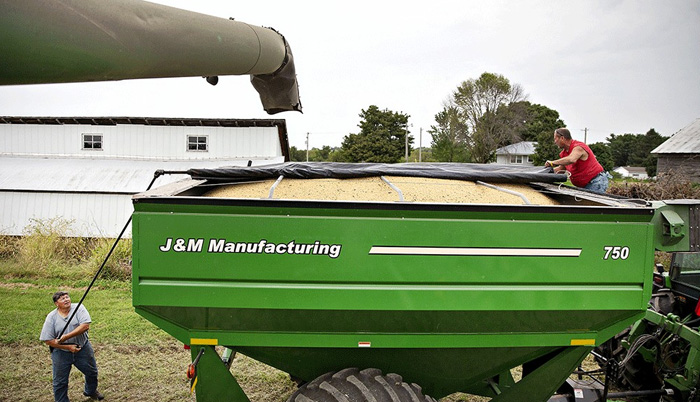![]() Home > Indonesia
Home > Indonesia
IPB Develop Winged-Bean Varieties To Supplement Soybeans

Farmers cover a grain cart containing soybeans during harvest in Wyanet, Illinois, the United States, on Sept. 18. (Bloomberg/Daniel Acker)
![]() October 26th, 2022 | 12:04 PM |
October 26th, 2022 | 12:04 PM | ![]() 964 views
964 views
BOGOR, WEST JAVA
A research team from the Bogor Agricultural University (IPB) has developed three varieties of winged-bean -- locally known as kecipir -- as potential legume alternatives to soybeans.
Muhammad Syukur, IPB agriculture professor and head of the research team, said that kecipir is very similar to soybeans -- it has 30-35 percent protein content, like soybeans. Kecipir also can be produced at a rate of 4 tonnes per hectare (ha).
“Unfortunately, kecipir development has been slow,” Syukur said on Saturday.
The IPB team has developed and registered three kecipir varieties at the Agricultural Ministry, namely, Sandi IPB, Melody IPB dan Fairuz IPB.
The latter two varieties have received plant variety rights from the ministry -- the first of such rights given to kecipir varieties -- this year. Plant-variety rights are a form of intellectual property rights to protect new varieties of plants.
The three varieties have between 31 and 33 percent protein content, with a productivity rate of 3-4 tonnes per ha.
Kecipir, he said, are among local legume varieties that can be used as an alternative to soybeans and are able to be made into tofu, tempe and kecap.
The team has also developed four varieties of black-eyed pea, locally known as kacang tunggak, which has 22-24 percent protein content and 3-4 tonnes per ha productivity rate.
One of the kacang tunggak varieties, Albina IPB, has also been developed into tempeh.
“The product is branded Tempe Sehat Albina and was registered in 2020,” he said.
Data from the Food and Agriculture Organization (FAO) show that Indonesian soybean consumption averaged 3.2 million tonnes per year in the last five years, of which 2.67 million tonnes came from imports. This heavy dependence on imports makes Indonesia vulnerable to supply disruption.
Source:
courtesy of THE JAKARTA POST
by Theresia Sufa (The Jakarta Post)
If you have any stories or news that you would like to share with the global online community, please feel free to share it with us by contacting us directly at [email protected]